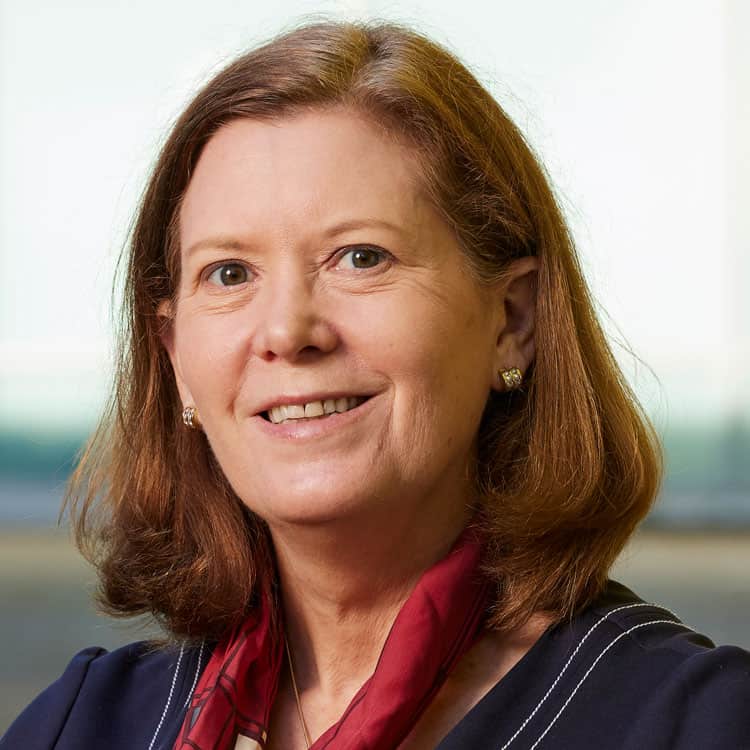Libraries Investing Ahead: An Interview with Mimi Calter
In the concluding interview of our series, Mimi Calter, chair of IFLA’s Academic and Research Libraries Section, discusses the importance of regional perspectives on information access and the complex challenges today’s libraries face – beyond just budgets.
Click here to catch up with previous instalments of Libraries Investing Ahead
This interview, facilitated by Linda Bennett of Gold Leaf, is the last in our current series “Librarians Staying Ahead”. In this conversation, Mimi Calter describes the sweeping changes that are taking place in librarianship and the fundamental challenges that librarians are facing.
Mimi is Chair of the Academic and Research Libraries Section of IFLA and Vice Provost and University Librarian at Washington University in St. Louis (WashU).

De Gruyter Brill and Gold Leaf would like to take the opportunity to thank all the librarians who have contributed their time and expertise to this series.
Linda Bennett: Could you tell us a little more about your role at the International Federation of Library Associations and Institutions (IFLA) and how you interact with librarians from other countries?
Mimi Calter: Currently I chair IFLA’s Academic and Research Libraries Section. IFLA’s organizational structure can be a little challenging, so let me give that a little context. IFLA has three areas of volunteer engagement: its 5 regional councils, its 5 advisory committees, and its professional divisions. The professional divisions, of which there are eight, are home to more than 40 sections and special interest groups, including Academic and Research Libraries (ARL).
The ARL committee consists of 21 librarians from across the globe, and we have an ongoing program of professional development work, outreach and skill building for our research library colleagues, which we undertake both on our own and in collaboration with other sections. We have a webinar program, which typically runs four programs a year and a blog program which publishes about twice per month.
The IFLA year runs September through August, so we are still in a relatively early part of this year, and we are in the process of surveying our committee membership about regional concerns. We will use that input to plan the webinars, blogs, and other programming that we will present during the year ahead.
LB: Libraries throughout the world are experiencing budget squeezes at the moment, but in some countries the cuts have been particularly deep. How does this affect your work for IFLA?
“One of the things I find most fulfilling about my work with IFLA is the insight it has given me into the differing regional approaches to information access and resourcing.”
MC: IFLA, as an organization, has long been engaged with economic issues related to libraries. Those concerns drive IFLA’s engagement on copyright, on accessibility concerns, and, notably, the recent, successful (!) work to build information accessibility into the Sustainable Development Goals (SDGs), currently being directed by the United Nations. My committee is a part of that work and can take advantage of IFLA’s international engagement, even while we focus on the pieces of that work that are most relevant for academic and research libraries.
One of the things I find most fulfilling about my work with IFLA is the insight it has given me into the differing regional approaches to information access and resourcing. In parallel, an important piece of my work for the ARL committee is ensuring that those regional perspectives are presented and engaged with. That starts with ensuring that we have good regional representation on our committee.
For example, my predecessor as chair did a lot of work to bring in colleagues from Central and South America, and I’m pleased that because of that engagement, and representation from Brazil, we are now preparing to do our first Portuguese-language webinar. Much of what we do is designed to provide a platform and a voice for these international perspectives, and I’m pleased that we are finally able to highlight these South American perspectives.
LB: What is so different about South America?
MC: Well, it’s just that the region has a unique perspective. I’ve come to understand from my colleagues that, for example, the South American cultural perspective on public libraries is very different, and there is less trust in them as an institution than we are accustomed to seeing in North America or Africa.
LB: Does IFLA engage in fund-raising activities?
MC: Within our committee there is limited fund-raising, and it’s on a small scale. Most notably, we receive funding from Sage to support conference attendance for those who can’t afford it. The larger IFLA organization carries out fund-raising on behalf of the organization.
LB: What impacts are you seeing from those budget cuts?
MC: Budget challenges to libraries are not new, though it is true that the budget squeezes of the last two years have been especially challenging. We’re constantly looking at how best to work on scholarly dissemination – the impact of technology, the emergence of AI, dramatic shifts in politics and the funding associated with them are all challenges, but more profound than these are changing perspectives on academia and the role it plays in society. How to respond to this appropriately is a much bigger issue. Cultural norms are changing and we are changing with them – we are trying to find our way forward in creating the path for librarians. How we integrate AI and support workers with discovery are part of this issue.
LB: What are the challenges that you face besides financial ones?
MC: Open access (OA) and explaining it has become a big topic for us. OA represents an important marker in the way we think about research. Even with the current administration here and all the challenges associated with US infrastructure, there is a big push for openness. We’ve been having some good conversations about, for example, open metadata.
“Information wants to be free and it also wants to be expensive!”
The definitional question is: what does open access mean? My observation is that it means different things to different people. Some Global South perspectives seem as if they’re looking for someone to underwrite the costs of publishing. Yet we still have the challenge of wanting research to be “open” in the abstract – then we come up against the hard realities of tenure promotion and paywalls. Information wants to be free and it also wants to be expensive! Even in the USA, open access is not universally embraced.
For IFLA, it means something different; for example, we’ve taken a stand against double-dipping. The big publishers are doing really well and finding ways around the problems with different implementations. In Europe it’s different, as they’re often dealing with larger, country-level solutions.
LB: How do you see your role at IFLA developing?
MC: I’m in my second term as chair of ARL and am beginning to look for further opportunities. On my to-do list is for the committee to set up somebody new when the elections come round again in two years’ time. The time I spend on it is variable but significant. It’s been more demanding this year. I probably spend between two and four hours a week on IFLA-related work.
I would like the next person who takes this role not to be North American. I’d be really pleased to see someone from a less well-known country in the post. I really want to bring in a bit more new blood.
There’s plenty of space for me to move within IFLA; it’s an organization I’ve been involved with for a long time. It’s very bureaucratic and I’ve come to understand how it works. There’s now an opportunity for me to move through it.
LB: Turning to your own library, what are the major challenges it faces and how is it addressing them?
MC: We have the same budget challenges that everyone faces. The university is going through a belt-tightening exercise – there are changes to research funding, some restructuring of departments and budgets. However, I’d like to repeat what I said before – that budget is an issue but there are deeper challenges. The library did lose certain roles as the result of budget cuts, but addressing the deeper changes and new technologies is harder.
Part of my team is looking at AI in the pedagogy context; the library is part of a broader university conversation about this. It is part and parcel of a new type of change – change both in what and how the library teaches. It involves thinking about resources differently; for example, we’re very thoughtful about data, how it should be processed, managed and used. We need to know that such resources can be used effectively in AI, and we’re therefore getting our backs up about some of the more massive contracts.
We’re thinking very holistically about our collections, which consist of a very broad group of materials. We’re reluctant to devote our dwindling budget to traditional services.
LB: In the USA – and, because of that, in many other parts of the world – higher education has been under attack in recent months. What do you think will happen to higher education – and by extension, the libraries that serve universities – in the next two to three years?
MC: We are already seeing a dramatic shift in research funding, which overall will mean fewer research projects, which will reduce the overall number of publications commissioned. This, combined with changes in the way researchers think about communication, will lead to changes in the publishing industry and the relationship between libraries and publishers.
“Access to resources will always be key to libraries’ missions, but the way those resources are produced and distributed will change.”
More attention will be paid to paywalls. There will be a notable shift in the way things are done. This means that librarians will need to be really thoughtful about long-term contracts, but also about the breadth of library services. Access to resources will always be key to libraries’ missions, but the way those resources are produced and distributed will change.
LB: Could you tell readers a little about your own professional career?
MC: I’ve spent most of my career as a librarian. Right out of university, I worked for a medical publisher in Philadelphia, BC Decker. I worked in a few publishing jobs, both in the US and in the UK, where I spent a year working for Chapman & Hall. Back in the USA, I got a library degree, then worked in corporate libraries, for PriceWaterhouseCoopers and Goldman Sachs. Most of my librarian career was spent at Stanford, but my time in corporate libraries was very formative. I came to Washington University St. Louis four years ago, as the University Librarian.
LB: Mimi Calter, thank you very much indeed for sharing with us your fascinating insights.
Check out the whole blog series
[Title Image by Trifonov_Evgeniy/iStock/Getty Images Plus]
